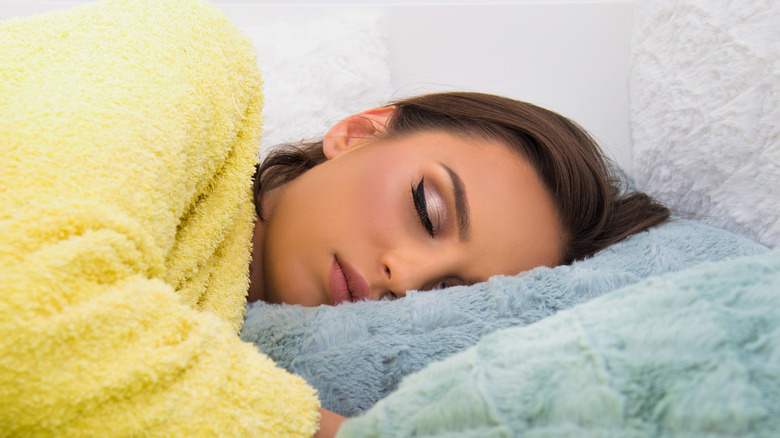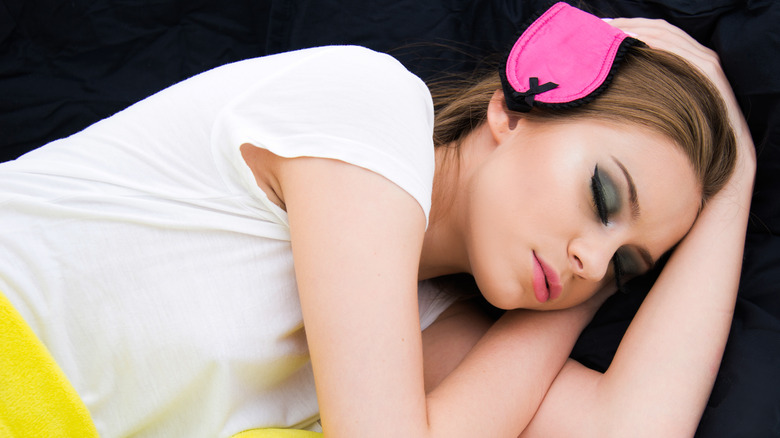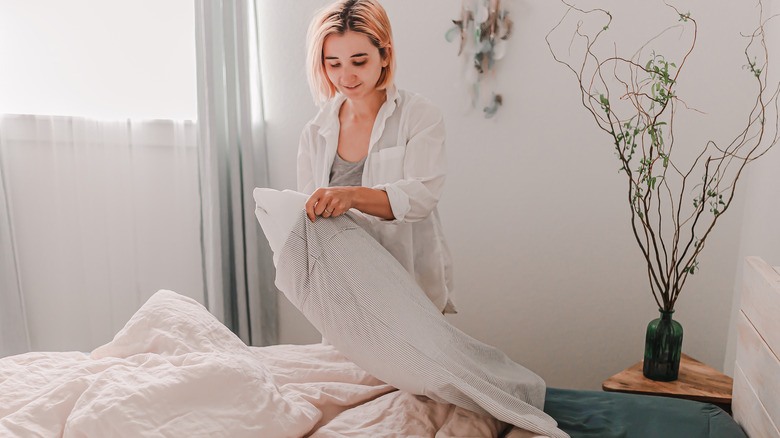Expert Describes What To Do If You Accidentally Fall Asleep With Your Makeup On – Exclusive
Beautiful skin is always in, and we go to great lengths to achieve it with skincare products and treatments. With tons of brightening ingredients that banish dullness to wrinkle-fighting potions, the beauty aisles are flooded with options and finding the right products can be overwhelming. Sometimes we add too many products and make the mistake of not being consistent with our skincare routine and wonder why we don't see results. Choosing the wrong products or not using the right products correctly is a cardinal sin when it comes to skincare. Another thing that can create havoc on your skin is makeup.
Most of us probably use the same makeup products for months beyond their expiration date. When was the last time you replaced your liquid liner? Glamsquad's director of makeup artistry, Kelli Bartlett, told Byrdie, "Redness, irritation, and infection are all side effects of expired eye products. Eyeliners are the biggest culprits when it comes [to] spreading infection." Even though they're pricey, they're not worth potentially messing up your eyes.
Another fact regarding makeup that most people are guilty of is sleeping with their makeup on. Maybe you partied too hard or got lazy and thought it was just this one time, but you've probably heard that you shouldn't sleep with your makeup on. We spoke with Dr. Liia Ramachandra about what to do if you do end up falling asleep with your makeup on. Mistakes happen, but it will benefit your skin if you don't make a habit of it.
Dr. Liia Ramachandra explains exactly what to do if you sleep with makeup on
Dr. Liia Ramachandra is a serial entrepreneur and healthcare executive. She holds a graduate degree in pharmacy and a doctorate in pharmacy from Groningen University, and a Ph.D. from the University of Utrecht, Netherlands. She is the founder and CEO of EpiLynx, a gluten-free skin care and cosmetics brand — if there's anyone's word you can trust, it's her's.
So, what if we missed washing our makeup off before bed? According to the American Academy of Dermatology (AAD), you should wash your face twice a day, and it's especially important at night as that's when your skin repairs and rejuvenates itself.
Dr. Ramachandra told The List, "Make sure that as soon as you wake up, you clean your face properly. This means using an oil-based cleanser to break down excess oil and makeup to start, and then following up with an oil-free foaming cleanser to get into the pores and remove any leftover dirt and impurities." She recommends using a gentle cleanser for that. "Do not overly exfoliate after you sleep with makeup on since you can make matters even worse and induce redness and breakouts," she added.
Now that your skin is clean and free of makeup, nourishing your skin is next. Dr. Ramachandra told us, "Follow up with proper moisturization, such as a clean serum filled with nutrients, followed up with a face cream that will nourish, moisturize and rejuvenate." She recommends choosing clean products that are gluten-free, hypoallergenic (free from known allergens) and plant-based.
How to control the damage after sleeping with makeup on
So, you've done the unthinkable and slept with your makeup on. If only you could turn back the hands of time and complete your nighttime skincare routine, but that's not possible. One thing you should do the next day is change your pillowcase. Dr. Dendy Engelman told Glamour, "If you don't launder your pillowcase and sheets the next day, you risk reverse contamination, so even if you end up washing your face before going to bed, that residual product will be on your pillowcase already, and in effect will transfer back onto your skin when you lie down." If you skipped cleansing and moisturizing your face the night before, sleep on clean sheets and pillowcases the next night.
If you're prone to skin irritation or clogged pores, it might be a good idea to skip makeup for a couple of days as it might make your skin conditions worse (via The Every Girl). It'll give your skin time to heal and recover from the damage caused by sleeping with makeup on.
Board-certified dermatologist Joshua Zeichner told Real Simple that sleeping with your makeup on could cause inflamed and irritated skin, and doing it frequently could speed up the aging process, reduce collagen production, and increase pigmentation. Keep that in mind next time you want to skip washing your makeup off, or keep some makeup wipes next to your bed and give extra TLC to your skin the next day.


